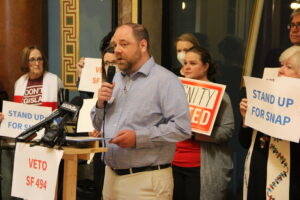Advocacy


The Des Moines Area Religious Council advocates for policies that will reduce food insecurity in the state of Iowa.
DMARC is a member of the Iowa Hunger Coalition, a 501(c)4 non-profit organization. The Iowa Hunger Coalition is a group of passionate anti-hunger organizations and individuals who work for effective policies and help educate Iowans on the causes, effects, and solutions of food insecurity and hunger in Iowa.
If you would like to learn more about our advocacy efforts or data visualization dashboard, please contact DMARC’s Policy and Advocacy Manager, Luke Elzinga, lelzinga@dmarcunited.org or (515) 277-6969 x10.
2023 Federal Farm Bill Priorities
Supplemental Nutrition Assistance Program (SNAP)
The Supplemental Nutrition Assistance Program (SNAP) is our nation’s largest food assistance program. DMARC supports policies that would improve benefit amounts and reduce barriers to participate in SNAP.
Improve Benefit Calculations
- Use the USDA’s Low-Cost Food Plan to calculate SNAP benefits, raising benefit amounts by 30%, including the minimum benefit amount.
- Eliminate the cap on the Excess Shelter Deduction to better assist households with high rent and utility costs.
- Create a standard medical deduction of $140 in every state for elderly and disabled people.
- Expand the ability to deduct excess medical expenses (greater than $35/month) to all SNAP participants.
- Introduce a “young child multiplier” to increase maximum benefit amounts by 20% for households with children between the ages 0 and 5.
Reduce Barriers to Participate
- Eliminate the three-month time limit for Able Bodied Adults Without Dependents.
- Eliminate the federal asset limit for SNAP.
- Raise federal income eligibility for SNAP from 130% FPL to 200% FPL, and allow states to expand income eligibility up to 250% through Broad-Based Categorical Eligibility.
- Repeal the lifetime SNAP ban for individuals with a felony drug conviction.
The Emergency Food Assistance Program (TEFAP)
- Reauthorize and increase funding for TEFAP food purchases to adjust for inflation and ensure food banks can continue to assist people facing food insecurity.
- Increase funding for TEFAP food storage and distribution.
- Continue funding TEFAP infrastructure grants to help cover the costs of refrigeration and fuel for food bank partner agencies.
- Increase funding for the TEFAP Farm to Food Bank Program to support local growers while providing food to people in need.
Gus Schumacher Nutrition Incentive Program (GusNIP)
- Expand investment in the Gus Schumacher Nutrition Incentive Program (GusNIP, formerly FINI) to increase efforts to expand access to fresh fruits and vegetables, such as the Double Up Food Bucks program and produce prescription program.
- Create a new tier of grant funding to support statewide expansion of nutrition incentive programs, with programs at the statewide scale not competing with funds dedicated for current tiers. The new tier of grants would be 100% federally funded, with no local matching funds required.
SNAP-Ed
- Continue funding SNAP-Ed to strengthen nutrition education programs for individuals enrolled in SNAP.
- Increase flexibility for program activities, evaluation, and allowable expenses to increase community engagement in SNAP-Ed.
SNAP Employment & Training (E&T)
- Continue investing in SNAP E&T to provide program participants with free opportunities to build skills and gain education.
- Continue operating SNAP E&T as a voluntary program, and not a mandatory one.
Specialty Crop Block Grant Program
- Increase funding for the Specialty Crop Block Grant Program (SCBGP) to support farmers growing vegetables, fruits, and nuts for human consumption.
- Extend USDA’s food procurement and distribution programs to nonprofits beyond the TEFAP system to increase access to locally grown nutritious food in underserved areas.
- Re-evaluate USDA’s nutrition procurement program to prioritize domestically-grown fruits, vegetables, and nuts.
2023 State Legislative Agenda
- State investment in the Double Up Food Bucks program, which incentivizes the purchase of fresh fruits and vegetables by SNAP participants
- Update the income eligibility for SNAP to 200% FPL to make the program accessible to more Iowans experiencing food insecurity
- Expand free and reduced-price school meals by providing Healthy School Meals for All
- State investment to support recent refugees to the state while they get settled
- Support programs that empower Iowans to lead healthy, self-sufficient lives by bridging gaps in opportunity and building stronger, more resilient communities
